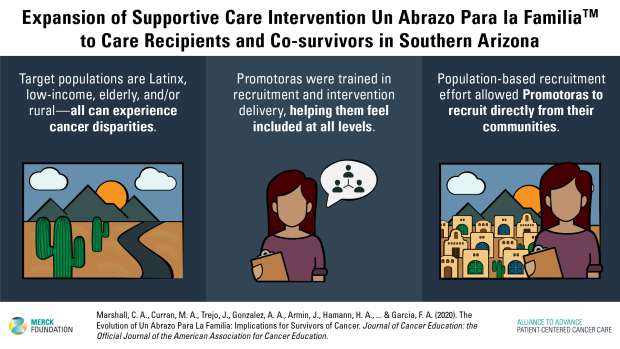In a follow-up to their previous publication Oregon’s Familias en Acción replicates benefits for underserved cancer co-survivors through Un Abrazo Para la Familia, the team at the University of Arizona have expanded their Un Abrazo Para La Familia intervention to recruit and deliver the supportive care program to care recipients themselves.
While Abrazo was originally designed to help co-survivors cope with a loved one’s cancer diagnosis, the intervention team decided to expand the program to care recipients themselves. Thirty care recipients from existing cohorts in Tucson & Portland revealed clear benefits for cancer survivors. Data collected show that both cancer knowledge and self-efficacy (confidence in that cancer knowledge) significantly increased within the care recipient group. These results gave researchers the confidence to go forward with the recruitment of survivors as well as co-survivors. More data on the impact of Un Abrazo Para la FamiliaTM should be available soon.
The recent publication in the Journal of Cancer Education discusses how the team at the University of Arizona expanded recruitment to care recipients from underserved populations (Latinx, low-income, elderly, and/or rural) in the University of Arizona Cancer Center’s catchment area in Southern Arizona, an area with a population of roughly 1.8 million people. In order to properly handle their new recruitment area and strategies, promotora (community health worker) training and intervention outcome measurement have been expanded as well. A vital aspect of this expansion is the partnership between the University of Arizona and the Arizona Community Health Workers Association (AzCHOW). These new recruitment strategies allowed promotoras to “recruit directly from their communities” and facilitated a significant increase in the number of participants recruited.

The team learned valuable lessons to improve their promotora training to increase its effectiveness and efficiency. These lessons range from programmatic—having promotoras familiar with the Abrazo program lead the training and simulate what it is like to be a participant in the Abrazo intervention—to administrative—increased preparation to improve coordination and communication, providing breaks to trainees to ensure maximum focus, and time management. Additionally, a competency-based test was delivered in June 2018 to 10 promotoras who had completed the training to examine their ability to successfully deliver the Abrazo intervention. Results from the CBT show that the trained promotoras demonstrated the necessary skills to lead and direct the Abrazo intervention.
In their efforts to help mitigate some of the fear and anxiety that come with a cancer diagnosis for both caregivers and care recipients, the University of Arizona has aimed to assist the underserved populations of their geographic region. With a strong training program and expanded recruitment strategies, the positive evolution of the Abrazo intervention demonstrates that it is an effective and successful method to increase cancer knowledge and self-efficacy in cancer care recipients. The work being done through the Abrazo intervention offers a flexible and potentially sustainable approach to help navigate the uncertainty of a cancer diagnosis.
Learn more: Marshall CA, Curran MA, Trejo J, et al. The Evolution of Un Abrazo Para La Familia: Implications for Survivors of Cancer [published online ahead of print, 2020 Apr 1]. J Cancer Educ. 2020;10.1007/s13187-020-01737-x. DOI: 10.1007/s13187-020-01737-x
